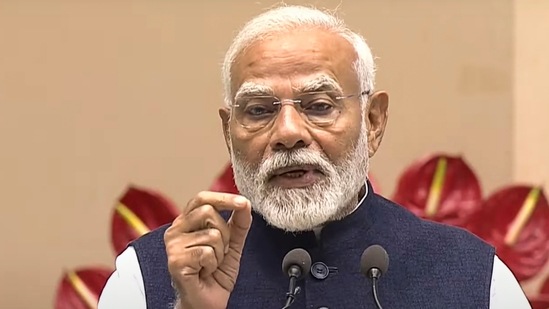What is a privilege motion, moved by Congress against PM Narendra Modi?

Jul 31, 2024 04:33 PM IST
As members, the elected representatives enjoy certain rights and immunities called privileges. A motion can be raised if members commit a misuse such privilege.
Congress MP Charanjit Singh Channi on Wednesday moved a privilege motion against Prime Minister Narendra Modi in the Lok Sabha for sharing the speech of BJP MP Anurag Thakur on his social media platform X. The party has alleged that the video shared by PM Modi contained defamatory portions that were directed at Leader of Opposition Rahul Gandhi. These remarks were later expunged from house proceedings by the Speaker.

What is parliamentary privilege?
As elected representatives, the members of the House enjoy certain rights and immunities to effectively discharge their functions.
India lacks a law that defines what is a parliamentary privilege. Article 105 in the Indian Constitution explicitly mentions only two kinds of privileges, freedom of speech in the Parliament and the right to publish the house proceedings.
The Code of Civil Procedure, 1908, grants freedom from arrest and detention of members under a civil process during house proceedings or during the functioning of any of its committees. Members also enjoy immunity for forty days before its commencement and after the conclusion of any house or committee proceedings.
Apart from the Indian constitution and Code of Civil Procedure, privileges are also based on house rules and other parliamentary conventions. Members are not liable for any court proceedings for anything said or published regarding house or committee proceedings.
What is a privilege motion?
If a member believes that such a privilege has been breached or misused, a motion or complaint can be raised to the house chairman or speaker.
Two conditions exist – the question shall be restricted to a specific matter of recent occurrence and the matter requires the intervention of the Council.
What is the process?
The Speaker/Chair upon initial examination can either admit or reject such motion. When admitted, the motion is then referred to a privileges committee consisting of members nominated by him from time to time.
The committee on examination of a privilege motion can make recommendations that it deems to be fit. It can also call relevant persons and is empowered to look at related documents if any. A report shall be presented within a maximum time limit of one month or at an early date suggested by the Chair/Speaker.
After the committee submits its report, the House can consider the recommendations and suggest amendments. Penal action against members is recommended only in extreme cases.















